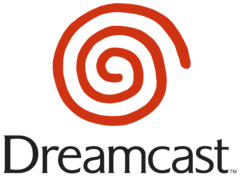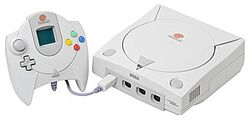Dreamcast: Difference between revisions
(move MIL-CD albums to its own category) |
(fix PS1 console link) |
||
| (2 intermediate revisions by the same user not shown) | |||
| Line 46: | Line 46: | ||
| style="border-style: solid; border-width: 1px; text-align:center" | [[Sega]] | | style="border-style: solid; border-width: 1px; text-align:center" | [[Sega]] | ||
| style="border-style: solid; border-width: 1px; text-align:center" | 1988 | | style="border-style: solid; border-width: 1px; text-align:center" | 1988 | ||
| style="border-style: solid; border-width: 1px; text-align:center" | WEC Museum owns a pink ''[[Sakura | | style="border-style: solid; border-width: 1px; text-align:center" | WEC Museum owns a pink ''[[Sakura Wars Online]]'' Dreamcast Keyboard. | ||
|- | |- | ||
| style="border-style: solid; border-width: 1px; text-align:center" | [[Sega Dreamcast Controller]] | | style="border-style: solid; border-width: 1px; text-align:center" | [[Sega Dreamcast Controller]] | ||
| Line 287: | Line 287: | ||
| style="border-style: solid; border-width: 1px; text-align:center" | [[bleem!]] | | style="border-style: solid; border-width: 1px; text-align:center" | [[bleem!]] | ||
| style="border-style: solid; border-width: 1px; text-align:center" | 2001 | | style="border-style: solid; border-width: 1px; text-align:center" | 2001 | ||
| style="border-style: solid; border-width: 1px; text-align:center" | [[PlayStation]] emulator | | style="border-style: solid; border-width: 1px; text-align:center" | [[PlayStation (video game console)|PlayStation]] emulator | ||
|} | |} | ||
| Line 309: | Line 309: | ||
[[Category: Computers and consoles]] | [[Category: Computers and consoles]] | ||
[[Category: Computers and consoles by Sega]] | [[Category: Computers and consoles designed by Sega]] | ||
[[Category: Computers and consoles by Tec Toy]] | [[Category: Computers and consoles manufactured by Sega]] | ||
[[Category: Computers and consoles manufactured by Tec Toy]] | |||
[[Category: Computers and consoles designed in Japan]] | [[Category: Computers and consoles designed in Japan]] | ||
[[Category: Computers and consoles released in 1998]] | [[Category: Computers and consoles released in 1998]] | ||
[[Category: Computers and consoles released in 1999]] | [[Category: Computers and consoles released in 1999]] | ||
[[Category: Sixth-generation video game consoles]] | [[Category: Sixth-generation video game consoles]] | ||
Latest revision as of 23:49, 15 June 2024

| |
| Dreamcast | |
| Designer | Sega |
|---|---|
| Manufacturer | Sega Tec Toy (Brazil) |
| CPU | 200 MHz Hitachi SH-4 32-bit RISC |
| Graphics | 100 MHz PowerVR2 |
| Memory | 16 MB RAM 8 MB Video RAM |
| Media | GD-ROM, MIL-CD Audio CD |
| Released | JP: November 27, 1998 NA: September 9, 1999 EU: October 14, 1999 AU: November 30, 1999 |
| Added to Museum | September 9, 1999 |
Dreamcast was the fifth, and final, home console by Sega.
It was released in Japan on November 27, 1998, in North America on September 9, 1999, in Europe on October 14, 1999, and in Oceania on November 30, 1999.
Development
On June 23, 1997, Sega's Chief Operating Officer announced "the Saturn is not our future", publicly revealing for the first time that the company was working on a successor. This console would use a 200 MHz Hitachi SH-4 for its CPU and a 67 MHz ARM processor for sound. The code name for the console was Katana, but it was given the name Dreamcast by the time it hit retail stores.
Media
The gigabyte disc format was developed for this console, both as a larger storage medium and to deter piracy. However, pirate games were released that played on the console less than a year after the release of the console outside Japan.
The Music Interactive Live-CD was a digital optical storage format using standard compact disc media.
The purpose of the MIL-CD format was to allow music companies to release music CDs with multimedia functions that could be played on a Dreamcast.
Discontinuation
Sega announced that it was discontinuing the console on January 23, 2001. Production of new games continued in North America until February 14, 2002, in Europe and Oceania until April 26, 2002, and in Japan until March 8, 2007.
Legacy
The Dreamcast continues to have an active commercial life among independent game developers.
Dreamcast hardware owned by WEC Museum
| Title | Manufacturer | Release | Notes |
|---|---|---|---|
| Dreamcast | Sega | 1998 | WEC Museum owns two North American Dreamcast units. |
| Dreamcast Keyboard | Sega | 1988 | WEC Museum owns a pink Sakura Wars Online Dreamcast Keyboard. |
| Sega Dreamcast Controller | Sega | 1998 | WEC Museum owns three Sega Dreamcast Controllers. |
| Visual Memory Unit | Sega | 1998 | WEC Museum owns a blue VMU. |
Dreamcast games owned by WEC Museum
Dreamcast applications owned by WEC Museum
| Title | Developer | Released | Notes |
|---|---|---|---|
| Action Replay CDX GameShark CDX |
Datel Interact |
2000 | Cheating device |
| bleemcast! for Gran Turismo 2 for Metal Gear Solid for Tekken 3 |
bleem! | 2001 | PlayStation emulator |
MIL-CD albums owned by WEC Museum
| Title | Developer | Released | Notes |
|---|---|---|---|
| 09 Chairs | Snappers | 1999 | MIL-CD album |
| Heartbreak Diary | dps | 1999 | MIL-CD album |
